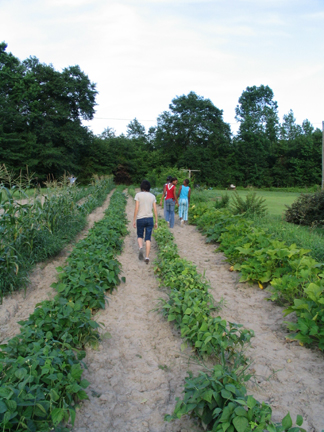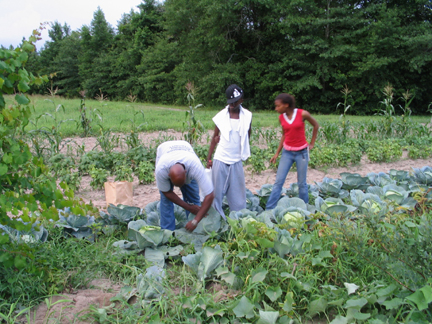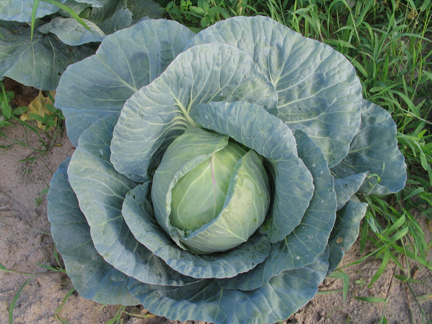Columbus County trip
Another battle with rush hour traffic, this time riding in the first bench seat in a twelve passenger Wilmington Housing Authority van. I’m riding with Lynn, a few kids from public housing, and the Chief of Community and Support Services for WHA (also the van driver) Randolph Keaton.
In the crawl of traffic, Randolph asked me a billion questions about growing organically, everything from pest control to “what does organic mean” with a few queries thrown in on my background and where I was from. I answered the organic questions with all the detail I could muster, in a van that was blasting the air conditioning and music that was a little too loud.
Let me back up a second…How did I end up in this van? This local food adventure will take me where it wants, and I thought I was going to check out some land that might be brought into organic production. When Lynn picked me up to go meet with Randolph, I found out that we were actually going to harvest a bunch of produce for distribution to Wilmington public housing residents. I kind of laughed and thought about it. Good thing I always wear boots.
We were headed to Columbus County, the fifth poorest county in the state of North Carolina. We were on our way to Randolph’s family land, where he has a home and a large garden, and also where his brothers and sisters have homes and gardens.
Randolph talked a lot about how out-of-county farmers were planting and harvesting on Columbus County land with no involvement of local folks and how people are putting up trailers instead of homes only to be put in the situation of losing family land to the bank after not being able to pay on loans.
The area we drove through reminded me of my hometown in New York, of the rural poverty of agricultural counties that rely on out-of-county agribusiness to provide farm jobs and a way of life. In many cases, people would have been surprised at the images along the Columbus County roads, but I had seen it all before, in a different culture with different people in different trailers. Yet all of it was the same, and I was transported to the muck in rural Genesee County, NY riding in a van with out of state plates, daydreaming.
Randolph’s family land is near a slave cemetery that he said he is trying to get the State to restore. His family has 30 acres and used to have a 5 acre tobacco allotment, which they sold some time ago. The farmer who bought it never grew tobacco, instead growing soybeans. This year the land was fallow, and Randolph had it bush-hogged. This was where I saw an incubator farm in the future, a place to teach self sufficiency and how to generate an income from sustainably tending the land.
Five acres is a lot of land for an incubator farm. Split into 1/4 acre plots, this land could train twenty new growers every season, or be less ambitious and train five farmers for a career in sustainable agriculture, something that would make this county stand out and deliver the organic produce that the whole country is calling for right now. It just needs a start, some push to bring the neighbors in on the idea.

When we got out of the van, we immediately walked to the end of the garden and set to picking cucumbers. We picked a couple nice bushels, and headed on to the potatoes, green beans, squash and cabbage.

I hadn’t seen cabbage that big in awhile, not since my teen years spent harvesting tons of it every day in the summer. The cabbage we sell at the store is in the 5 pound range. This was 15 to 20 pound cabbage, the kind that – if this were a commercial farm – would end up going off for processing into canned coleslaw, cabbage rolls, and flash frozen stir fry mixes.

We harvested several bags full of produce for the kids to take to their families. Lynn filled a bag with green beans, potatoes and cucumbers and also grabbed a big cabbage. Lynn and I also pulled up a few handfuls of wild garlic, one head of which I ate right on the spot, which Randolph found very strange.

For my help, Randolph gave me a peach tree in a pot and let me cut a luffa gourd to take home. He wasn’t sure what it was that was growing, and he didn’t want any part of it when I explained to him what it was. I’ll probably dry it out and use it…maybe.
As the threat of thunderstorms approached, we loaded the veggies and trees and people into the van for the ride back to Wilmington. Unfortunately, there was a stop at the fast food oasis, which didn’t make sense to me. Here we were picking all this great fresh produce, and we stop at McDonald’s, the vortex of empty food? It saddened me that this was a reward for the kids for their work instead of the reward being at trip to the country and bags full of good food. Lynn and I sat out the McDonald’s detour. I snacked on green beans and thought about the gazpacho sitting in the fridge.
If we’re going to get an incubator farm going in Columbus County or anywhere in eastern North Carolina, we have to get out of the habit of supporting unsustainable, unhealthy and unfullfilling food. We have to appreciate and understand the rewards of produce, meat, diary and eggs from small community farms before we can talk about encouraging new farmers. New farmers aren’t going to sell to fast food places; they are going to sell to us. If we don’t start eating what they produce, we’ll be back in the same situation again, wondering where we went wrong, discussing things over a cheeseburger made with meat from Chile.
I have to bluntly connect the dots, so forgive me if I don’t support certain food choices…
July 3, 2007 at 10:10 am
Err…, I’m afraid I’m still lost on what an incubator farm is.
But the conclusion of this post is great.
July 8, 2007 at 2:24 pm
An incubator farm is a farm that is designed to train people on how to farm – hands on learning.
July 22, 2008 at 9:18 pm
As an African-American reader of your blog, I was struck by your inability to recognize what was for me an obvious observation. Public housing projects are usually located in “food deserts”. Through no fault of their own, the young people that you met might not have palates accustomed to fresh fruits and vegetables especially if their families receive TANF or food assistance. Have you priced store-bought produce recently? Add the extra prices charged on products sold in low-wealth neighborhoods and you have a situation in which access to healthier food options is difficult at best. In order to educate someone about alternate choices, you must first understand and accept them at their own level instead of automatically imposing your values and choices on them. For those young people, stopping at Mickey D’s was an activity that THEY valued. Instead of passing judgement, you could have used that moment as a learning opportunity not just for them but for yourself.
In short, you weren’t picking up on some subtle cultural nuances either. One example: whose dream is it to turn this farm into an incubator? If this is the Keaton homeplace, did it occur to you that the rest of his family might want to have some input on the incubator scenario especially since they already have their own homes and gardens on the property? Or that their family members are probably interred in that slave cemetery that you mentioned? Mentally coveting land for an incubator farm and stating that the neighbors need a “push” to accept the idea sounds almost as regrettable as the actions of the other out-of-county farmers Mr. Keaton mentioned. What are his goals for the future of the farm?
July 23, 2008 at 10:10 am
To address some of your points, I must first state that I find it interesting that if there were no pictures in this post you would not have known that Randolph or the kids were African American. It is my feeling that this is a economic class issue, not a race issue.
I am well aware of “food deserts” having grown up in one. However, this particular place would not be considered to be in one. The housing project where we picked up the kids is three blocks from a large Food Lion. The farm we went to is in a food desert though.
About McDonalds, the kids were stoked to be picking fresh veggies and they talked about what their families did with certain types of produce. Instead of building on that, we stopped at a fast food place and reinforced what marketers have been drilling into their young minds.
And with the incubator farm, this was something that Randolph mentioned and has mentioned more and more over the last year. I was riffing on the idea and have been over the last year as well. The “push” is not a bad thing considering that unemployment is epidemic in the county and folks are looking for new ideas. Why not an incubator farm? You can make a couple hundred dollars with tobacco on five acres or $50,000 in mixed organic vegetable production on the same amount of land. If the family doesn’t want to do it, fine. But the residents of the area are looking for *something*, so I will throw out any idea I can think of.
July 24, 2008 at 2:43 am
Points noted. However, your post did not mention whether Mr. Keaton had any input into the concept of having his property used as an incubator farm. Since the the majority of individuals living in public housing in Wilmington are African-American, I can say with a great deal of statistical certainty that those “kids from the projects” tend to look a lot more like me than you. Race IS an issue when you’re talking about black-owned farms, especially in this state. Just ask Gary Grant or any of the farmers here in North Carolina who spearheaded the current USDA discrimination litigation.
Also, your numbers are off. Five acres of prime flue-cured tobacco should fetch around $20K not a few hundred dollars. Burley would bring in a higher value. As far as your estimate for mixed organic vegetable production goes, that amount would more easily reached if Columbus County were closer to Cary and Chapel Hill rather than Lumberton or Wilmington.
Overall, the wording of your post implied an intention to further your own interests without taking into account whether the Keatons or their neighbors were already practicing economic self-determination. As Mr. Keaton made introductory inquiries about you and your background, you were already silently subdividing his farm! You “sat out” the McDonalds visit because you disagreed with the decision that was made to purchase food there. You were “saddened” but chose not to apeak up.
Apparently it was much easier to state your beliefs in a public forum yet far more difficult to express them as you stood on principle. If the young people that you met or Mr. Keaton were to view the content of your recent post, how do you think they would feel about your portrayal of them? Have they ever read your blog? Understanding others is a two-way street. A little empathy and cultural sensitivity go a very long way.
July 26, 2008 at 12:08 am
Why would these kids be anything but excited about the ideas of ‘fast food’ grown from some huge commercial garden? They are raised in a state of ‘government providence’ where they are not the providers nor their parents. Government will solve their problems or the government won’t let that business serve them, (yeah right).
These kids are being taught to look anywhere but inward for what they may need to survive in life. Social services, food programs and politicians raising taxes on the rich to pay for the needs of the poor(ly motivated).
If karma was in effect, those that work hard would get rewarded not taxed more. Those that didn’t work hard would live lesser lives and not be taking handouts seized from the working people in the form of taxes.
I’ll never look at a self-sustaining system like this again without thinking that motivation has to be the grown product and not the produce. The produce are the fruits of labors and they are to be savored.
July 26, 2008 at 10:01 am
Trace,
I currently live in Columbus County and I am so glad you wrote about us here. This is among the poorest areas in the state but it is so rich in potential. I am not a native of this area and I am in the learning phases of sustainability. There are some people here(not just in Cary and Chapel Hill) who want to eat organically and live closer to the Earth. I am even operating a business based on that very fact. I would be very interested in getting involved in a project here in Columbus Co. Let me know how I can.
Thanks
July 28, 2008 at 8:21 pm
Goldspinner – I’m not sure what your problem is with me as it is obvious that you
have only read this one post that was written almost a year ago. You
do not know my relationship with public housing, Randolph or this
community in general.
The purpose of a blog isn’t to give a detailed back history on EVERY
possible thing that can come up EVERY time a post is made. It is a
snap shot at best.
Randolph and I were recently acknowledged for our work with developing
a Southeastern Regional Food System that speaks heavily for
economically disadvantaged farmers and minority farmers, those
underrepresented by current agricultural structures.
The tobacco might fetch $20k but the overhead for generating that type
of money from conventional tobacco will take a lot more of that profit
than would mixed organic production. And there are organic farmers in
Sampson, Pender and Columbus counties doing extremely well right where
they are. One of North Carolina’s biggest organic farms is in
Whiteville.
The incubator idea was Randolph’s. We spoke about what I knew about
it and provided some information on what is currently working and who
would help. Maybe the wording didn’t make clear that this would be
Randolph’s project from start to finish. I would not be involved in
anything but the idea. I have my own land to think about, located in
an area already served by various incubators.
What is so wrong about pushing an idea?
From your tone it is apparent that “cultural sensitivity” is a one-way
street. I speak about people as they are and my opinions as they are.
I do not live other people’s experiences and cannot write about them.
I cannot write from a black perspective, but I also should not write
in a culturally sensitive way because that only furthers the way we
seem to always be at odds with each other. It is better to tell the
truth and talk out our differences than to soften everything so that
racially and economic divides remain in place for generations. I
don’t believe in that and will not support that way of living.
There are 106 posts on the blog. Let me know when you’ve read them
all. Maybe you will understand my perspective a bit more and see that
maybe we are on the same side.
July 29, 2009 at 1:30 pm
Do you know if any progress has been made in getting the incubator farms off the ground in Columbus County? I am in the process of starting a restaurant in Whiteville modeled after the One World Everybody Eats Community Kitchen in Salt Lake City. I would love to use produce from the local area. Also do you know how I could contact Randolph? I read this post 2 years ago and have been thinking about it since then. I now have the time/ability to help accentuate the positives of Columbus County. Any help you could give in the way of connecting me with Randolph would be appreciated.
August 11, 2009 at 11:13 am
Vickie:
I haven’t heard from Randolph in quite some time. I have been in Chatham County for almost a year, and before that kind of lost touch with Randolph. You should be able to track him down through the county (either Columbus or New Hanover).